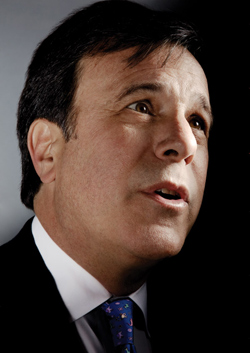Web Attacks Can Diminish Your Good Name, But Something Can Be Done

David Ardia, director of the Digital Media Law Project at Harvard Law School’s Berkman Center for Internet & Society. “The amount of information available about most individuals today far exceeds any other time in human history. … That many of us don’t have control over how that information is shared is a significant change.” Photo by Stanley Rowin
Florida lawyer Frank Sheppard can’t recall when he first learned that a disgruntled litigant had put up a website attacking his firm, but he won’t easily forget the embarrassment it caused.
An Internet search for Rumberger, Kirk & Caldwell also displayed Lying Scumbags, a site created by pro se plaintiff Billy R. Kidwell, who sued General Motors, alleging it sold him a defective pickup truck. Rumberger Kirk was GM’s counsel.
Anyone checking for the law firm online couldn’t miss the ugly slur even if they didn’t open the link to the site, which also attacked Florida judges and GM.
“Clients who know us and our integrity and reputation for good service were not fazed, but it was still embarrassing,” says managing partner Sheppard, who is based in Orlando. “It annoyed the partners. We realized it was getting a lot of attention.”
A different sort of unwelcome attention surprised Dallas attorney Dale Markland. It began when an opposing counsel wrote a thinly disguised attack in the form of an “apology” for having canceled a deposition shortly after Hurricane Ike hit the Gulf of Mexico region in September 2008.
“I am sorry that a hurricane hit Houston,” the letter began, and it continued with a litany of excuses for saying “I’m sorry,” ending with “I am sorry you are from Dallas.” Bloggers jumped on the story, and Markland, founding partner of Markland Hanley, was inundated by reporters’ calls.
“After two years we’ve pretty much gotten past that issue,” Markland says, but he is reluctant to talk about it for fear of rekindling controversy. “I’m not worried about my reputation with people that know me or might want to know me. The biggest problem was the inordinate amount of time it took.”
Neither of these incidents did lasting damage, but they illustrate the Internet’s potential in a networked world to shape and alter reputations.
As important as it is, no one controls one’s own reputation. Reputations are shared opinions about how one might behave based on the observation, gossip and hearsay of others. Yet these fluid assessments make possible the trust and social connections that help build community, foster collaboration, develop client bases and facilitate markets. In professions that provide a service, like law, reputation is nearly all those businesses have to sell.
The Internet offers the potential for making more accurate reputational assessments by making more information available. But it also leaves the ones assessed with less control. Facts and opinions&mdashvalid or vicious&mdashare available to millions of people, most of whom we have never met.
And especially for those with a business presence online, information abounds from third parties, including social networks such as Facebook; directories like Avvo, which rates lawyers and doctors; and sites that aggregate public records like OpenSecrets.org, which tracks political contributions.
“The amount of information available about most individuals today far exceeds any other time in human history,” says David Ardia, director of the Digital Media Law Project at Harvard Law School’s Berkman Center for Internet & Society. “We rely on a lot of third parties. The fact that many of us don’t have control over how that information is shared is a significant change.”
Consider the case of Florida lawyer Larry Joe Davis Jr., who sued Avvo alleging invasion of privacy and deceptive and unfair trade practices after he tried unsuccessfully to remove his profile from the site. His amended complaint (PDF) charges that Avvo publishes false and misleading information, and that it manipulates lawyers’ ratings to coerce their participation.
Avvo denies the allegations. “We’ve been sued three times and each time it’s been by a lawyer with misconduct in his background,” says Avvo founder and CEO Mark Britton. “What they are really concerned about is that we are bringing greater transparency to their indiscretions.”
In Davis’ case, his Avvo profile states he was cited for professional misconduct. In 2007 the Florida Bar handed Davis a public reprimand and three years of probation related to convictions for indirect criminal contempt for failure to pay child support, according to court documents.
Davis responded to Britton via e-mail: “If I were a consumer looking for an expert attorney in a certain practice area in Florida, I would look to the Florida Bar’s website, floridabar.org, because it correctly lists board-certified expert attorneys [and] includes a detailed description of any disciplinary history, with background documentation immediately available by link so the consumer can see what the discipline was all about.”
“I don’t know why the discipline is really being mentioned” by Avvo, he told the ABA Journal in September. “It’s a regrettable personal matter that didn’t have anything to do with my practice or representation of clients.”

Victoria Pynchon, attorney-mediator and arbitrator, publisher of the negotiation law blog: “I have a conscious, active presence on the Internet on every available channel. It’s more or less been a natural unfolding of my opportunity to say who I am and what I do.” Photo by Sal Owen
FREEWHEELERS
Some lawyers embrace the Web’s free-flowing interactivity. They view the Internet as a chance to share their work and opinions more widely.
“It would never occur to me to do something to protect myself” from misrepresentation, says attorney-mediator and arbitrator Victoria Pynchon, who writes the Negotiation Law Blog. “I have a conscious, active presence on the Internet on every available major channel. It’s more or less been a natural unfolding of my opportunity to say who I am and what I do.”
Yet with every opportunity comes risk. Virtually anyone with a keyboard and a browser can find ways to be heard, even if what they say embarrasses, disparages or defames.
“Technology tools are so easy to use that somebody who you might have seen walking around the sidewalks with a sandwich board can leverage the credibility of a website,” says law firm marketing consultant Ross Fishman of Highland Park, Ill.
Consider the experience of New York City criminal defense attorney Scott Greenfield, a prolific and popular blogger who was targeted by an angry individual whom he said stalked him online. Greenfield turned to his followers last year for help in a post at his law blog Simple Justice:
“A couple of weeks ago, [a reader] Googled my name and found some insane, vile posts about me on the second page,” Greenfield wrote in June. “My psycho stalker is still working hard through the night trying to get his inane nonsense on the first page of Google.”
Noting that putting his own name in the title of his post would “push the insane posts down the list by one,” Greenfield wrote that “it would be really great if everyone did a nice post about me and used my name in the title, so that the insane posts could be pushed back to page 28.”
Greenfield’s strategy buried the defamatory posts but didn’t stop the attacker, who continued to target him and others defending him.
“He would start new blogs daily or weekly; he started fictional Twitter accounts, 50 or 60 of them,” Greenfield recalls. “He would link to the followers of his targets and send out tweets about these people, too.”
Finally others who were attacked enlisted law enforcement in the community where the cyberstalker operated to facilitate a resolution. There was no court involvement.
“Everything was taken down, including our posts about him,” Greenfield says. “I would not have taken it down had it been up to me alone, but I was asked to do so by another person who wanted to put this to rest.”
A lawsuit would have been useless, Greenfield says. “There were no assets to go after. Are you willing to spend $25,000 to $50,000 to chase this individual away? And there’s no guarantee it will work.”

Scott Greenfield, criminal defense attorney, creator of the blog, Simple Justice: “You never know who didn’t call because of something they saw on the Internet.” Photo by Len Irish
SUIT STRUGGLE
Defamation cases are famously tough to win, and the courts extend special protections to operators of online services. Unlike other publishers, they can’t be held liable for remarks contributed by third parties, even when the statements are false or damaging.
This protection under section 230 of the Communications Decency Act of 1996, aimed at encouraging innovation, helped spur the growth of popular sites that rely on user-generated material, like Wikipedia and YouTube.
Yet there is a dark side to unfettered speech. One of the most publicized cases involved two female students at Yale Law School who were the subject of sexually offensive and anonymous slurs on AutoAdmit, a widely followed discussion board for law students. They filed suit in 2007.
The sustained attacks were “uniquely sadistic, subjecting the women to what can only be called a cyberstoning,” journalist David Margolick wrote in a February 2009 article in the now-defunct Condé Nast Portfolio magazine. One of the women claimed she was turned down for summer jobs because her potential employers saw the offensive posts.
Because AutoAdmit was protected by section 230, the women’s only legal recourse was to sue the anonymous posters for defamation, invasion of privacy and other charges. Their attorneys uncovered the identities of some defendants, some of whom agreed to settle for undisclosed sums. The case was voluntarily dismissed in 2009 without prejudice.
After law school, the women went on to apparent success: One became a Luce scholar specializing in international human rights law; the other joined the international firm of Cleary Gottlieb Steen & Hamilton. Yet some caches of threads from AutoAdmit still appear in searches of their names.
CHANGE 230
The AutoAdmit case reignited a vigorous, ongoing debate about whether Internet speech protections are overly broad. Among the most prominent advocates for more restrictive interpretations of the law is Daniel J. Solove, a law professor at George Washington University.
“The courts have twisted section 230 into a radical protection of free speech that goes beyond the text,” Solove says. “They’ve turned it into a kind of carte blanche immunity to be irresponsible. It doesn’t give you a right to harm other people by spreading lies or invading their privacy.”
A study published last year by Ardia from Harvard suggests plaintiffs in online defamation cases rarely prevail in getting favorable judgments, but they achieve some success in getting material removed. The study, published in the Loyola of Los Angeles Law Review, analyzed decisions that invoked section 230 since the statute’s enactment in 1996.
The court dismissed plaintiffs’ complaints in more than three-quarters of the cases based on section 230 and other grounds. Only 16 percent succeeded in establishing that the third-party source of the content was liable&mdasha slightly higher rate than typical in defamation cases, the study reported.
Yet in 55 percent of the cases, the material was no longer available from the third party because the defendant had voluntarily removed it, ceased operations, settled with the plaintiff or, in a small number of cases, complied with a court order.
Plaintiffs sued the original source of the material in more than half the cases, and their success rate was in line with that reported in other studies examining defamation litigation, the study found.
Ardia’s research leads him to favor maintaining the “breathing space” that service providers enjoy under the law. Rather than rely exclusively on legal remedies, Ardia suggests looking to technology, social norms and competitive market forces to help deal with reputational harms.
“We’ve gone through a period of information glut without having a lot of really useful tools for focusing on the information that’s relevant and reliable,” he says. But “there are strong forces at work that will change how information is rated, shared and indexed online.”
An example of technological progress is Dispute Finder, a free browser add-on that alerted users when information they read online was disputed by a source they might trust. It also displayed a list of articles supporting other points of view.
The project, a joint effort of Intel Research and the University of California at Berkeley, ended in July when its lead researcher, Rob Ennals, left Intel for Google. But Dispute Finder represented an emerging class of tools aimed at making the Web more reliable and credible.
Market forces are at work as well. “A site is valuable to people because they can rely on the information, and if they’re constantly being misled they’re not going to return to that source,” Ardia says.
He predicts the Internet will evolve into two parallel arenas. In one, information will be viewed as relevant and useful. Reputational disputes will be deterred or resolved through systems of response and reply. In the other, speech will be viewed much like graffiti on a bathroom wall&mdashignored or discounted.
Solove is less sanguine. “People will often get imperfect knowledge that will stick in their brain more than the correct knowledge,” he says. “Studies show that even untrustworthy, discredited information tends to be remembered more than true information.”
Younger people especially “see online as the equivalent of offline,” Solove says. “They think, ‘If I gossip to someone in person, why not put it up on the Internet?’ But the Internet pushes the information beyond a particular social circle, and it’s more permanent.”
RSVP TO RAPS
The Internet’s broad reach is precisely what gives the Web its power. Businesses have learned that it’s better to respond proactively to a complaint on a high-profile site than to stay outside the conversation or file a lawsuit. “There really is no legal remedy,” Ardia says.
Sheppard, whose firm was attacked on the Lying Scumbags site, got the material removed without filing a suit, but it took considerable effort.
“We wrote a letter to Mr. Kidwell demanding he take slanderous and false information down,” Sheppard says. “He didn’t. We ended up writing a letter to the host of the website. We figured out who that was and reviewed that company’s terms-of-service agreement. It was clear that Mr. Kidwell was in violation because of the slanderous and defamatory information he posted. … It may have taken more than one letter, but we got it accomplished eventually.”
As for Markland, he felt helpless to respond immediately when the “I’m sorry” letter hit the Internet. “Our website was under construction. We are a small firm. We had three lawyers at the time. We had our hands full” just with legal work, Markland says.
Now Markland Hanley has a polished website featuring accolades about his professionalism. Two of the testimonials are from attorneys who also served as opposing counsel on the case that generated the letter. The site also displays prominent links to Markland’s rebuttals to the letter.
Neither Markland nor Sheppard believe their firms lost business over the incidents. Yet even ardent advocates of protected speech such as Greenfield acknowledge one can never be sure about the impact of an online dust-up.
“You never know who didn’t call because of something they saw on the Internet,” Greenfield says.
Sidebar
Managing Your Online Reputation >>
A Punch List
• Know what’s being said about you. Search your name. Google ranks its results based on how many sites link to a page where your name occurs. If you opt out, you’re letting someone else define your reputation, says Andy Beal, co-author of Radically Transparent: Monitoring and Managing Reputations Online.
• Make yourself the best source of information about you. Set up online resumés with a photo in three places: Avvo (because they’ll do it even if you don’t claim it), LinkedIn and Justia’s lawyer directory. If you can’t do it, let your kids do it. They’ll know how, says Nicole Black, co-author of Social Media for Lawyers: The Next Frontier.
• Decide how you want to interact with clients and other lawyers. Use social media sites if you’re comfortable with that. Blog if you want to, but don’t if you lack passion or talent, Black says.
• If you want full control, focus on your own website. But you better make it work. If the site doesn’t show up as the first result on your name search, you’ve failed, says Igor Ilyinsky, founder of FirmWise, a Chicago-based Web-hosting service for law firms.
• Join the conversation. Even if you don’t plan to tweet or blog, be ready to respond to anything negative or capitalize on the positive. But don’t overreact. As a first resort, get bad information corrected or taken down, Beal says.
• Provide context. You can immunize yourself from the potential harm of a piece of stand-alone negativity. Make sure to present your full career of success and achievement, but don’t solicit positive comments and certainly don’t fake them, says David Ardia of Harvard Law School’s Berkman Center for Internet & Society.
• Develop a thick skin. The time may soon come, Ardia says, when so much about our lives is online that a lack of criticism will cause readers to wonder what’s being hidden.
Clarification
Print and early Web versions of the April feature story “Staking Your Reputation,” implies that the Dispute Finder browser add-on, which could alert users to disputed online information, is still available. The Intel project ended in July when developer Rob Ennals left Intel and was later removed for the Web.
Barbara Rose is a freelance journalist in Chicago.



